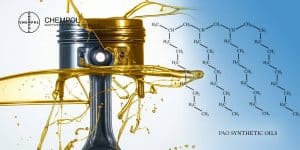
The Rise Of Synthetic Oil With Performance, Efficiency And Sustainability
As an expert in the lubricant industry, you understand that conventional oils aren’t always the perfect fit for demanding machine operations. Synthetic oils boast superior lubrication performance, helping clients reduce downtime and maximise the lifespan of their valuable machinery. Let’s break down what sets synthetic oils apart:
The Science Behind the Performance Boost
Synthetics, as raw materials, are used to refine mineral oils for lubrication. These are developed in a laboratory setting, molecule by molecule. This provides them with the ability to withstand extreme conditions. In comparison to their traditional equivalents, lubricants added to the synthetic blends are far more able to withstand heat, pressure, and pollution.
Viscosity stability in them provides machinery with adequate lubrication instantly, regardless of whether it is being started at a low temperature or at a high temperature. Synthetic materials achieve a significant reduction in initial wear and also maintain their best performance under load.
Synthetic materials have a lower thermal breakdown and oxidative resistance, which allows them to last longer service intervals than those made of natural materials. This implies that your clients will have better uptime, and the price of lubrication will decrease.
Key Factors to Consider for Your Industrial Lubricant Clients

Viscosity is Key: The familiar ‘W’ ratings apply! Consult equipment tolerances and operating environment to match synthetic oil viscosity for ideal lubrication in all operating conditions.
API Certifications Matter: Don’t overlook API ratings (such as those for gear oils) on quality synthetics. These ensure compatibility with specific gear types, critical hydraulic systems, and other application-specific needs.
Specialised Formulas for Demanding Industries:
Synthetics exist that are designed for food-grade needs, extreme heat applications, enhanced water resistance, etc. Consult reputable lubricant suppliers to match the right synthetic to the task.
Types of Synthetic Oils: The Options at Your Disposal
Full Synthetics: It is designed for peak oil performance and extended service life. It is ideal when oil is used in critical equipment or harsh operating conditions. They might cost more upfront, but longer change intervals reduce long-term costs.
Synthetic Blends: They offer improved lubrication over conventional or non-additive oils at a moderate price point. It is suitable when full synthetic oil may transition to older equipment that has not used synthetic oil before.
High-Mileage Formulations (Adapting the Automotive Idea): Just like with cars, this is an option! Specialised synthetic-based lubricants often make a dramatic difference if you see age-related issues in your target equipment (seal stiffening, leaks starting).
PAO Synthetic Oils

PAO stands for polyalpha-olefin. Think of it as a highly advanced type of synthetic oil. But it’s not made the same way as typical lubricants!
Building PAOs from Scratch
PAOs are born in the lab, not refined from crude oil. Scientists start with simple gases and chemically link them into strong, uniform molecules. These molecules are the backbone of PAO synthetic oils.
Why PAOs are Extra Special
These lab-made molecules bring serious advantages:
- Incredible Stability: PAOs resist breaking down in harsh conditions—extreme heat, pressure, or contamination. This means a longer life for the lubricant and better protection for the machinery using it.
- Ultimate Flexibility: Scientists can precisely control the molecule size. This means tailored lubricant viscosity, offering a wider range of performance than basic oils.
Where You’ll Need PAOs
- PAOs are inside demanding applications across many industries:
- Engine Oils: For high-performance cars or engines working in brutal heat or cold.
- Gearboxes: They provide smoother operation and greater protection for expensive components.
- Hydraulic Systems: Delivering reliable lubrication under intense pressure.
- And More! PAOs even contribute to longer-lasting greases.
Ester Synthetic Oils
Esters are a special class of synthetic oils designed to outperform your typical lubricants. Instead of just refining crude oil, esters are made through a chemical reaction, creating a very specific base for top-notch lubricants.
The Ester Advantage
Here’s why you might consider ester-based lubricants for your industrial needs:
- Heat Warriors: Esters take control of temperatures that would degrade oils. This means oils stay protective under extreme loads and harsh conditions.
- Film-Forming Champs: They “cling” to metal surfaces incredibly well. That provides a constant protective layer that reduces wear and tear.
- Clean Machines: Esters help dissolve gunk and contamination, keeping your equipment’s parts running smoother and longer.
- Stay Strong: Even with intense shear forces (like inside gearboxes), esters maintain their viscosity and prevent breakdown.
Where Esters Works Best
Look for ester-based lubricants in high-performance applications:
- Compressors: Where heat can be a major issue, esters extend lubricant life.
- Engines: high-output motors, turbocharged engines, anything pushing the limits.
- Hydraulic Systems: When loads are heavy and precision counts.
- Specialised Greases: For bearings facing constant friction or harsh environments.
- And more! Esters’ flexibility adds protection to many demanding machines.
Find Where Synthetics Are Worth It
Reducing the downtime of your lubricants is your #1 priority. Synthetic materials reduce wear and tear, leading to more reliable oil performance and fewer expensive disruptions.
Long-term protection: lubricant-related wear adds up. Synthetics help you get the full lifespan out of expensive parts. This way it reduces the time and your spending.
Extreme environmental conditions: intense heat, frigid temperatures, high pressure. Synthetic blends have the formulation to outperform where conventional oil struggles.
Choosing the Right Synthetic Oil for Your Business

When advising clients and developing your line of industrial lubricants, it’s not just about picking ‘synthetic’ off the shelf! Focus on these areas:
Target Industry Insights: Understanding the machinery clients depend on allows tailoring lubricant choices. A general-purpose synthetic might be enough, or the solution may lie in more specialised synthetic variations.
Cost vs. Performance Balance: Full synthetics deliver the ultimate, but there may be instances where a synthetic blend is a good choice. Balancing the client’s cost constraints with their need for maximum reliability requires industry-specific knowledge.
Consultation Wins Trust: Position yourself as the expert consultant rather than just selling a product. Giving your clients an idea of a business that has a grasp of lubrication principles helps industrial clients confidently switch to synthetics that maximise their machinery’s lifespan and minimise costly downtime.
Pro Tip:
Your lubricant industry likely has an equivalent recommendation guide to the owner’s manual found in a car! Consult them for expert advice about matching synthetic lubricants to your client’s equipment needs and operating environment.
For More Information: https://chempol.co.uk


